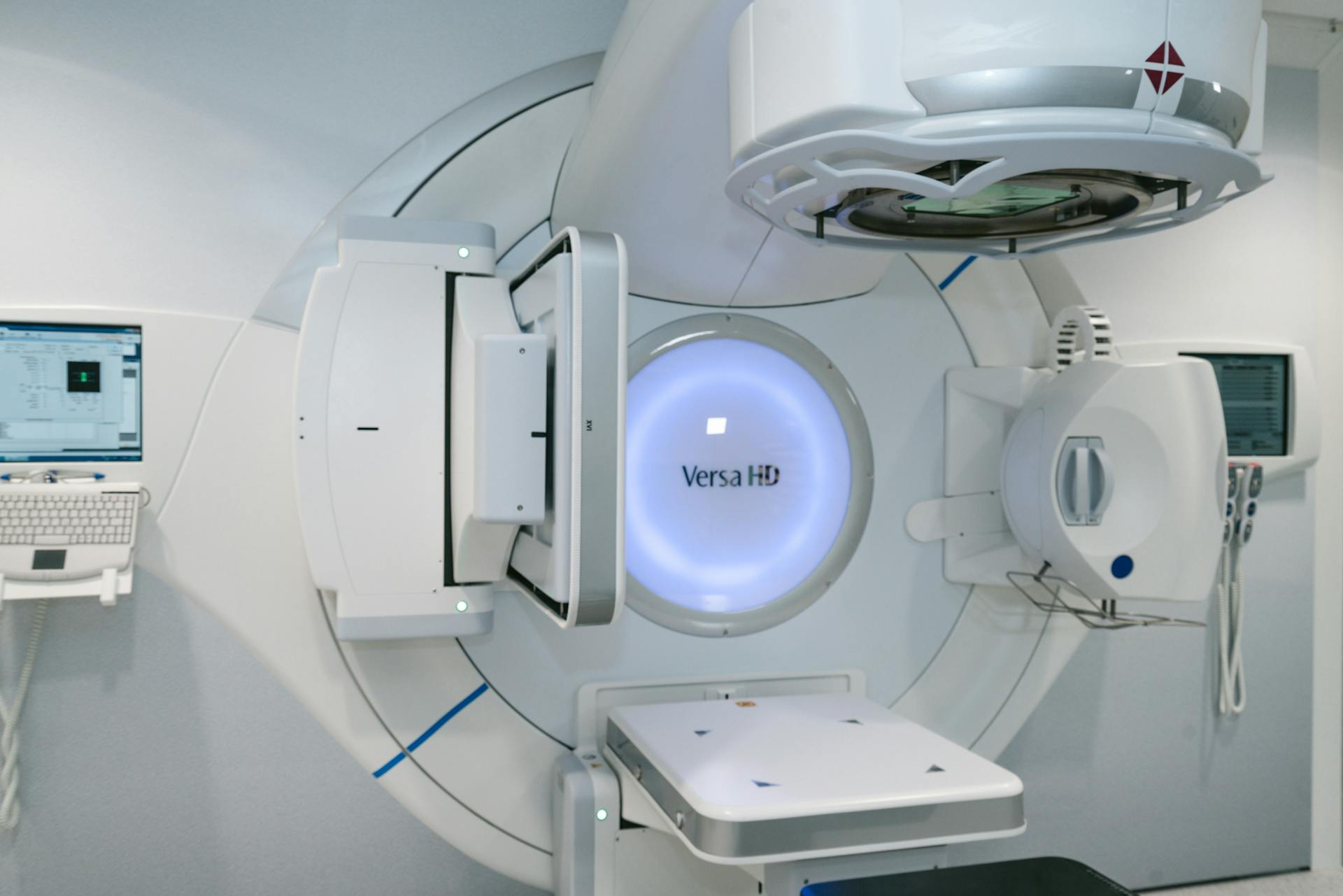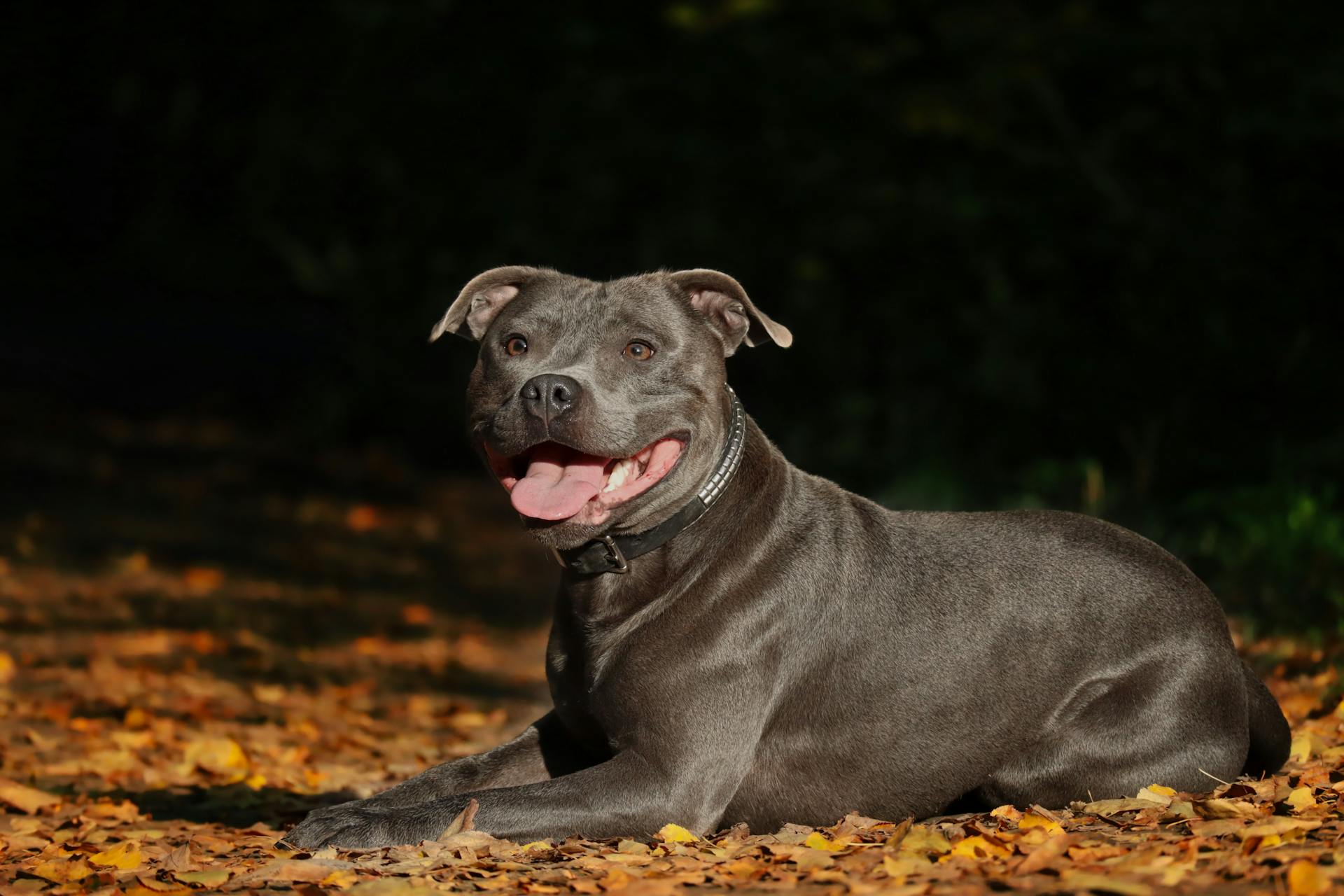
Canine cancer immunotherapy is a promising approach to treating cancer in dogs, offering new hope for pet owners and their furry friends.
Immunotherapy works by harnessing the power of a dog's own immune system to fight cancer, rather than relying on traditional treatments like chemotherapy and radiation.
Canine Cancers
Cancer is among the leading causes of illness in dogs, and it's essential to understand the different types to develop effective treatment plans.
Immunotherapy has shown promise in treating various canine cancers, including mast cell tumors, hemangiosarcoma, osteosarcoma, and lymphoma. A universal vaccine developed by the University of Wisconsin targets about 30 proteins present on cancer cells, priming immune cells to counter these cancers.
The nature of a cancer can help decide an appropriate immunotherapy approach. Hematological cancers can be treated with vaccines, while solid cancers require a different approach, such as direct intra-tumor injections or autologous vaccines.
Studies have shown good results with localized injections of natural killer cells in locally advanced osteosarcoma. Checkpoint inhibitor drugs have also been effective in treating oral melanoma in dogs.
Here's a breakdown of the different immunotherapy approaches for various canine cancers:
- Hematological cancers: vaccines
- Solid cancers: direct intra-tumor injections or autologous vaccines
- Localized injections of natural killer cells: locally advanced osteosarcoma
- Checkpoint inhibitor drugs: oral melanoma
It's worth noting that immunotherapy can yield the best results when the cancer is already receding due to other therapies such as radiation and chemotherapy.
Treatment Options
If your dog has cancer, it's essential to know that immunotherapy is a viable treatment option. Most immunotherapy techniques are still under development, but some have shown promising results in clinical trials.
The first widely-used canine cancer vaccine was developed for second-stage melanoma, with some dogs showing positive effects. However, the results were mixed, and the vaccine worked best when used in conjunction with radiation and surgery.
Currently, only a handful of commercially-available immunotherapy products cater to canine cancer, and most are still under development. Your veterinarian can help you understand the available options and their efficacy.
One treatment option that's available is personalized adoptive cell therapy for canine osteosarcoma. This therapy involves using the patient's own cells to fight cancer.
For another approach, see: Canine Parvovirus Vaccine
Immunity enhancer drugs are also on the market to counter canine mammary cancer. These drugs can be used in conjunction with other treatments to improve outcomes.
If you're considering immunotherapy for your dog, it's crucial to understand that it works best in conjunction with other cancer treatments. This means that your dog may need to undergo radiation, surgery, or chemotherapy in addition to immunotherapy.
Here are some canine cancers that respond well to immunotherapy:
- Mast cell tumors
- Hemangiosarcoma
- Osteosarcoma
- Lymphoma
Keep in mind that every dog is different, and the effectiveness of immunotherapy will depend on the individual patient. Your veterinarian can help you determine the best course of treatment for your dog's specific needs.
Cancer Treatment Limitations
One in four dogs is likely to develop cancer, making cancer treatment a significant concern for many pet owners.
The canine immune system has not been studied as extensively as the human immune system, which means most of what we know about canine immunotherapy is derived from human studies.
This lack of understanding makes it difficult to predict which dogs and which cancers are most likely to respond to immunotherapy treatment.
Lymphocytes, a type of white blood cell, in the canine immune system have not yet been fully characterized.
Cancers in dogs have not been as extensively identified as human cancers in terms of appearance and genetics.
As a result, it's challenging to create unique, personalized immunotherapies that would be appropriate for an individual dog's tumor.
Currently, only a handful of immunotherapy options are available for canine cancer patients.
These products are not very well regulated, so it's essential to be aware of the authenticity and safety of commercially-available immunotherapy products.
Your veterinarian can research and validate the efficacy and safety of these treatment choices.
Here are some of the most common canine cancers and the limitations of immunotherapy for each:
- Melanoma
- Mast cell tumors
- Osteosarcoma (bone cancer)
- Lymphoma
- Soft-tissue sarcomas
- Hemangiosarcoma
Progress Ahead
A lot more research needs to be done to catch up with human immunotherapy, but progress is being made.
The cost of development for dog treatments is not as robustly funded as in human medicine, with many dogs lacking insurance to cover the costs.
More money is slowly being poured into research around immunotherapy for dogs, with grants like the $775,000 awarded to Dr. Nicola Mason at the University of Pennsylvania’s School of Veterinary Medicine in 2018.
Veterinary scientists are becoming more interested in immunotherapy, and as dogs are recognized as good study models for some human diseases, more financial support is likely to follow.
As a result, we can expect to see more immunotherapy-based treatments in dogs over the next decade, making pet healthcare more effective.
Common Health Issues
Canine cancer is a leading cause of death in dogs, with over 1 in 4 dogs dying from cancer each year.
Lymphoma is one of the most common types of cancer in dogs, accounting for 12-14% of all canine cancer cases.
Melanoma is another common type of cancer in dogs, with the majority of cases occurring in older dogs.
Dogs with cancer often experience weight loss, lethargy, and loss of appetite.
The most common cancers in dogs are lymphoma, melanoma, osteosarcoma, and mast cell tumors.
Dogs with osteosarcoma often experience bone pain and lameness, while mast cell tumors can cause skin lesions and swelling.
For another approach, see: Boston Terrier Mast Cell Tumor
Fighting Cancer
Cancer is a common issue in dogs, with over 50% of dogs over the age of ten developing some form of cancer. The most common cancers are melanomas, mast cell tumors, lymphomas, and bone cancers.
Immunotherapy has shown promise in treating canine cancer, with some immunotherapies already being used to treat at least two different cancers in dogs, including osteosarcoma and lymphoma.
A cancer vaccine is being used to treat osteosarcoma, where tumor cells from the individual canine patient are harvested and made into a vaccine to stimulate the dog's immune production of T-cells.
Monoclonal antibodies are also being researched as an immunotherapy treatment for dogs, with a company called Vetigenics developing fully canine antibody fragments to treat cancer, as well as infections and immune-mediated chronic diseases.
Studies have shown that immunotherapy can yield the best results when the cancer is already receding due to other therapies such as radiation and chemotherapy.
On a similar theme: Canine Cancer Vaccine
Here are some of the most common canine cancers that respond well to immunotherapy:
- Mast cell tumors
- Hemangiosarcoma
- Osteosarcoma
- Lymphoma
It's worth noting that the canine immune system has not been studied as extensively as the human immune system, which means most of what we know about canine immunotherapy is derived from human studies. However, research is being done to make immunotherapy more precise and effective for canine cancers.
Highlights and Insights
Canine cancer immunotherapy is a promising area of research. New immunotherapy options are being explored, including one that could potentially treat canine cancer.
Videos on the topic are available, providing a deeper dive into the subject. Bio-X in the News often features updates on breakthroughs in this field.
One notable development is the possibility of new immunotherapy for canine cancer.
Sources
- https://www.seattlepup.com/single-post/there-is-hope-part-iii-immunotherapy-for-dogs-with-cancer
- https://animalwellnessmagazine.com/immunotherapy-for-dog-cancer/
- https://www.eurekalert.org/news-releases/521535
- https://www.labiotech.eu/in-depth/immunotherapy-for-dogs/
- https://biox.stanford.edu/highlight/new-immunotherapy-possible-canine-cancer
Featured Images: pexels.com


